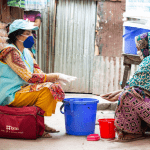Creating Jobs While Fighting Poverty: An Innovative Social Micro-Franchise Model Gains Traction in Haiti
It often seems that international aid organizations have lost touch with on-the-ground realities affecting the very population they aim to serve. Most of these organizations provide technical assistance and aid, but all too many are risk-adverse and sidestep investing in sustainable and scalable enterprises which focus on the bottom of the pyramid (BoP), a population that barely makes $1 to $3 a day. These businesses could provide stable jobs to communities where 90% of the jobs held are self-employment, not traditional employment. But since most international aid workers have never been self-employed, they may not fully appreciate the value of a steady paycheck – or the role of small businesses as job creators in low-income communities.
This disheartening disconnect has stagnated poverty reduction campaigns, leaving some of the world’s most vulnerable populations in continued desolation. All too often, as both government and NGO aid funds dry up, they fail to leave sustainable programs behind.
We’ve tried to reverse this dynamic at the Social Ventures Foundation (SVF), a non-profit focused on improving health, education, sanitation, water, environment, agriculture, energy, housing and transport in the world’s poorest communities. SVF identifies and vets startups and businesses whose products, services and/or job programs sustainably lift the livelihoods of the poor. We promote the best of these enterprises through our PovertyWatch newsletters and EndPoverty Global Virtual Summits. The foundation is also focused on meeting the unmet challenges of the poverty reduction space through our EndPoverty Sandbox, which develops sustainable and scalable micro-franchise business solutions to address global poverty with jobs and social impact.
We believe that social micro-franchise business models, which employ the poor to deliver affordable and sustainable products and services to poor customers, are particularly powerful tools for poverty reduction through business. These models provide smaller-scale, incremental sales opportunities to the micro-franchisees, with an engineered “last mile” channel to minimize costs and maximize outcomes. Studies on BoP business have confirmed the effectiveness of this approach, since:
- It provides poor businesspeople with a form of employment that combines the freedom of self-employment with the hand-holding and support of the franchisor, and the structure of a more traditional job.
- It goes a step beyond microcredit, which creates self-employment but leaves it up to the entrepreneur to create the business type. Since the business type is limited by the ideas and resources available locally, microcredit often results in an abundance of similar types of low-wage/low-tech enterprises saturating the same community, such as small retail stands.
How Micro-Franchising Can Fight Haiti’s Vitamin and Protein Deficiency Crisis
The SVF’s EndPoverty Sandbox focuses on Haiti: As the poorest country in the Americas, it’s ripe for a significant social impact. The foundation’s work aims to reverse a critical health crisis – the lack of essential vitamins and protein in many Haitians’ diet. Consider that:
- Over 6 million Haitians live below the poverty line of less than US $2.41 per day.
- Over 21% of the population is 15-24 years of age.
- The country has an unemployment rate over 70%.
- Over 58% of all households in Haiti are food insecure.
- Haiti loses over US $56 million in GDP annually to vitamin and mineral deficiencies.
- 30% of children under five years old are stunted.
- Anemia is rampant, afflicting two-thirds of children under five, three-fourths of children under two, and 60% of pregnant women.
In December 2018, the foundation launched V’ice Haiti: The program opened an office and a hub in the capital city of Port-au-Prince, and is using a micro-franchising business model to employ local poor people and sustainably lift their livelihoods – while also tackling vitamin and protein deficiency. To reverse this deficiency amongst the poorest members of the population, V’ice Haiti created two locally sourced products:
- V’ice® – Vitaminized Shaved Ice Cone with topping flavors of coconut, raspberry, lime, banana, mango and blueberry, made with clean water ice and vitamins that supplement the specific deficiency needs of the Haitian population.
- V’bar® – Vitaminized Protein Bar made fresh daily from locally produced vitaminized corn flakes and peanut butter sourced from locally grown peanuts.
Today, V’ice’s local sales team is delivering and selling its products at a price affordable by people who earn between $1 and $3 a day. Accomplishing its proof of concept – and earning revenue – V’ice is now scaling in Haiti.
V’ice Haiti’s Competitive Advantage: Innovations Plus Local Business Partnerships
V’ice has achieved this success by establishing a competitive edge in the market for “fresco” – the traditional Haitian dessert made from shaved ice. Fresco is usually made with unclean ice and unhealthy toppings, transported on bulky wooden carts traveling at less than 1 mph. In contrast, V’ice’s approach includes several innovations:
- V’ike – These Haitian-built, three-wheel, recumbent, fast-speed green transports allow V’ice vendors to deliver shaved ice point-to-point, to schools, public markets and neighborhoods.
- V’iceBox – This Haitian-built ice box with recycled Styrofoam insulation allows vendors to store and keep shaved ice cool, while selling V’ice in schools and neighborhoods.
- V’ice local business partnerships – The company is sourcing clean water from dloHaiti, Haitian corn flakes from Caribbean Food Manufacturing, and refined and enhanced vitaminized flavored toppings from Griffith Foods International.
Micro-franchisee vendors sell V’ice from V’iceBoxes at target markets ranging from streets and local outdoor markets, to schools and poor neighborhoods. Future scaling plans call for V’ice distribution in 23 coastal, non-mountainous, urbanized areas with over 20,000 inhabitants.
Spreading the Profits – Micro-Franchise Model Provides Ownership Pride
The V’ice sustainable micro-franchise business model builds and delivers value while creating self-employment opportunities for the poor in three market segments: public streets, schools and public housing.
SVF is looking to raise $250,000 in donations to initially scale its program and be able to demonstrate sufficient revenues in order to then raise $3 million in capital investment funding. This capital investment funding will then facilitate nationwide scaling of V’ice Haiti. Using a “hub and spoke system” the foundation will use the investment funds to:
- Establish over 50 V’ice hubs of up to 40 micro-franchisees each. Each hub will provide vehicle storage, ice/syrup production and pickup, and resources for micro-franchisee training and deployment.
- Support each micro-franchisee in selling on average 50 V’ice cones and 20 V’bars
- Impact 100,000 residents each day, via daily sales, ultimately reaching 61% of Haiti’s total urban population.
Over the course of five years, the funding will provide sustainable vitamin supplementation to over 5 million Haitian children, youths and adults annually. It will help create up to 600 sustainable jobs for the poor, which include:
- 160 micro-franchisee positions for youth conducting V’ike sales
- 200 micro-franchisee positions for mothers conducting V’ice homed-based sales
- 200 micro-franchisee positions for individuals conducting V’ice school sales
- 30 manufacturing jobs for primarily poor youths
- 20 management jobs for social entrepreneurs
Once the business achieves scale in Haiti, V’ice will rapidly scale to other developing nations. In the process, we aim to demonstrate the value of the Foundation’s social micro-franchise model to the development sector. We hope other social businesses, non-profits – and even international aid organizations – will join us in leveraging this “bottom up” approach to boost local employment and fight poverty, while also achieving other essential development goals.
Marc Blumenthal is Executive Director and Founder of Social Ventures Foundation.
Photo: A V’ice vendor at work. Photo provided by author.
- Categories
- Investing



